China deepens ties with Saudi Arabia with visit by Xi Jinping
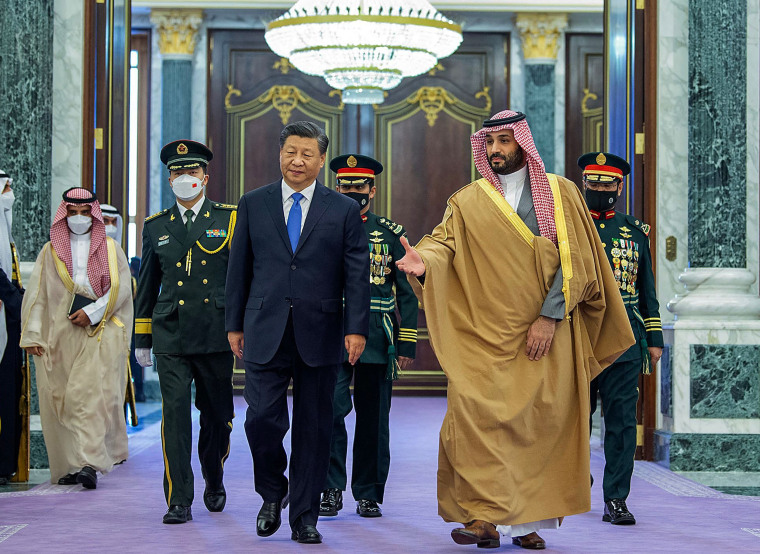
RIYADH, Saudi Arabia — Saudi Arabia and China showcased deepening ties with a series of strategic deals on Thursday during a visit by President Xi Jinping , including one with tech giant Huawei , whose growing foray into the Gulf region has raised U.S. security concerns.
King Salman signed a “comprehensive strategic partnership agreement” with Xi, who received a lavish welcome in a country forging new global partnerships beyond the West.
Xi’s car was escorted to the king’s palace by members of the Saudi Royal Guard riding Arabian horses and carrying Chinese and Saudi flags, and he later attended a welcome banquet.
The Chinese leader held talks with Crown Prince Mohammed bin Salman , de facto ruler of the oil giant, who greeted him with a warm smile. Xi heralded “a new era” in Arab ties.
The display stood in stark contrast to the low-key welcome extended in July to President Joe Biden , with whom ties have been strained by Saudi energy policy and the 2018 murder of Jamal Khashoggi that had overshadowed the awkward visit.
The United States, warily watching China’s growing sway and with its ties to Riyadh at a nadir, said on Wednesday that Xi’s trip was an example of Chinese attempts to exert influence around the world and would not change U.S. policy toward the Middle East.
A memorandum with China’s Huawei Technologies, on cloud computing and building high-tech complexes in Saudi cities, was agreed despite U.S. unease with Gulf allies over a possible security risk in using the Chinese firm’s technology. Huawei has participated in building 5G networks in most Gulf states despite the U.S. concerns.
Prince Mohammed, with whom Biden bumped fists instead of shaking hands in July, has made a comeback on the world stage following the Khashoggi killing and has been defiant in the face of U.S. ire over oil supplies and pressure from Washington to help isolate Russia .
In further burnishing of his international credentials, Saudi Arabia and the United Arab Emirates said on Thursday that the prince and the UAE president jointly led mediation efforts that secured the release of U.S. basketball star Brittney Griner in a prisoner swap with Russia.
White House press secretary Karine Jean-Pierre later said there was no mediation involved. “The only countries that negotiated this deal were the United States and Russia,” she said at a news briefing.
In an op-ed published in Saudi media, Xi said he was on a “pioneering trip” to “open a new era of China’s relations with the Arab world, the Arab countries of the Gulf, and Saudi Arabia.”
China and Arab countries will “continue to hold high the banner of noninterference in internal affairs,” Xi added.
That sentiment was echoed by the crown prince, who said his country opposed any “interference in China’s internal affairs in the name of human rights,” Chinese state broadcaster CCTV said.
Xi, who is due to meet other Gulf oil producers and attend a wider gathering of Arab leaders on Friday, said China would work to make those summits “milestone events in the history of China-Arab relations,” and that Beijing sees Riyadh as “an important force in the multipolar world.”
Saudi Arabia and other Gulf states like the United Arab Emirates have said that they will not choose sides between global powers and are diversifying partners to serve national economic and security interests.
China, the world’s biggest energy consumer, is a major trade partner of Gulf states and bilateral ties have expanded as the region pushes economic diversification, raising U.S. hackles about Chinese involvement in sensitive Gulf infrastructure.
The Saudi energy minister said Wednesday that Riyadh would remain a “trusted and reliable” energy partner for Beijing and that the two would strengthen cooperation in energy supply chains by setting up a regional center in the kingdom for Chinese factories.
Chinese and Saudi firms also signed 34 deals for investment in green energy, information technology, cloud services, transport, construction and other sectors, state news agency SPA reported. It gave no figures, but had earlier said the two countries would seal initial agreements worth $30 billion.

China’s Xi arrives in Saudi Arabia to ‘bolster ties’
Initial agreements worth $29bn will be signed during a Saudi Arabian-Chinese summit this week, according to the kingdom’s official news agency.

Chinese President Xi Jinping is in Saudi Arabia for a three-day visit that is likely to focus on energy ties as Beijing strives to revive its economy and Riyadh looks to expand its global alliances beyond its partnerships with the West, especially the United States.
Xi touched down on Wednesday in the Saudi capital Riyadh, Chinese and Saudi state media reported. The visit marks only his third trip abroad since the coronavirus pandemic began and his first to Saudi Arabia since 2016.
Keep reading
Saudis tell us that iran may attack the kingdom: officials, do relations with saudi arabia still serve us interests, china faces pressure at united nations after xinjiang report, yuan jumps after report saudis consider its use in oil deals.
Both Saudi and Chinese flags were on display in Riyadh. Xi waved from his plane and was welcomed by Riyadh’s Governor Prince Faisal bin Bandar Al Saud, Foreign Minister Prince Faisal bin Farhan Al Saud and the governor of the sovereign Public Investment Fund (PIF), Yasir Al-Rumayyan, according to the official Saudi Press Agency (SPA).
The White House warned on Wednesday that China’s attempts to exert its influence worldwide were “not conducive” to the international order.
“We are mindful of the influence that China is trying to grow around the world. The Middle East is certainly one of those regions where they want to deepen their level of influence,” said John Kirby, the US National Security Council spokesman.
It was “certainly not a surprise that President Xi is travelling around,” Kirby said, while adding that the US was focused on its own partnership in the region.
Xi is visiting at the invitation of Saudi King Salman “to bolster historic ties and strategic partnership between the two countries”, SPA reported on Tuesday.
Initial agreements worth $29.26bn will be signed during the bilateral summit, SPA said.
Xi will also attend the first China-Arab States Summit and the China-Gulf Cooperation Council Summit in Riyadh, according to the spokesperson of China’s Ministry of Foreign Affairs, Hua Chunying.
Saudi Arabia will remain a trusted and reliable energy partner for China, said Saudi Energy Minister Prince Abdulaziz bin Salman on Wednesday, according to SPA.
He noted that cooperation between China, the world’s biggest energy consumer, and Saudi Arabia, the world’s top oil exporter, had helped maintain global oil market stability.
Xi’s visit comes as China looks to deepen its relationships with countries in the Middle East amid growing strains in its ties with the US and other Western nations.
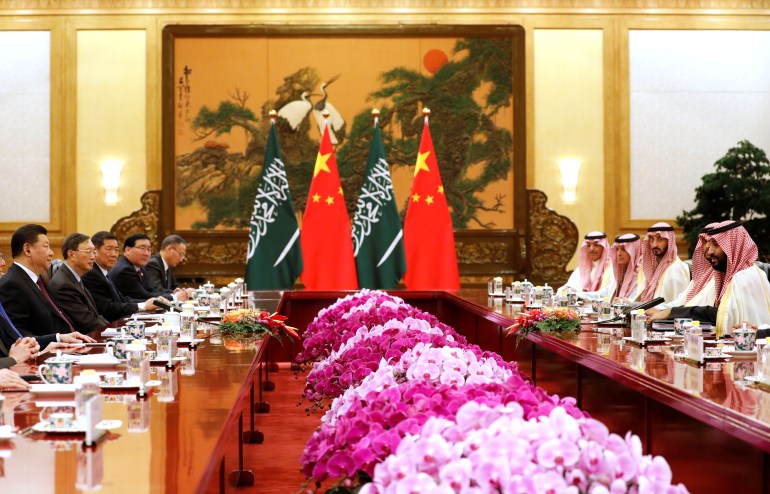
In an editorial, China’s Global Times, a state-run tabloid, described the China-Arab States Summit as “a milestone in the history of China-Arab countries relations”. The paper said that after the “severe impact” of the Arab Spring, the region had a “common desire” to avoid political turmoil and achieve stable growth and was “keenly interested in China’s experience”.
‘Deeper relations’
The summit with Saudi Arabia, chaired by King Salman and attended by Crown Prince Mohammed bin Salman (MBS), the kingdom’s de facto ruler, follows Xi’s confirmation in October as president for an unprecedented third term .
China is Saudi Arabia’s largest trading partner and MBS is expected to give Xi a lavish welcome, a marked contrast to the muted reception given to US President Joe Biden in July.
The visit reflects “much deeper relations developed in recent years” between the two countries, said Ali Shihabi, a Saudi Arabian analyst close to the government.
“As the largest importer of Saudi oil, China is a critically important partner and military relations have been developing strongly,” he said, adding that he expected “a number of agreements to be signed”.
MBS was in Beijing in 2019 when he held talks that focussed on energy deals and regional economic agreements aligned with Beijing’s Belt and Road Initiative, Xi’s globe-spanning infrastructure project.
The trip also coincides with heightened tensions between Saudi Arabia and the US over issues ranging from energy policy to regional security and human rights.
The latest blow to that decades-old partnership came in October when the OPEC+ oil bloc agreed to cut production by two million barrels a day, a move the White House said amounted to “aligning with Russia” on the war in Ukraine.
On Sunday, OPEC+ decided to keep those cuts in place.
Shihabi said the timing was “a coincidence and not directed at the US”.
In from the cold
China sees Saudi Arabia as its key ally in the Middle East due not only to its importance as an oil supplier but also a shared suspicion of Western countries, especially on issues such as human rights.
Saudi Arabia has remained silent on the situation in China’s far western region of Xinjiang, where the United Nations has said the detention of Uighurs and other mostly Muslim minorities may amount to “ crimes against humanity “.
Foreign Minister Wang Yi said in October that Saudi Arabia was a “priority” in China’s overall and regional diplomatic strategy.
China buys roughly a quarter of Saudi Arabian oil exports.
The oil market was thrown into turmoil with Russia’s invasion of Ukraine in February.
The Group of Seven (G7) bloc of nations and the European Union on Friday agreed on a $60-per-barrel price cap on Russian oil in an attempt to deny the Kremlin revenues to keep up the war, stoking further uncertainty.
“Oil will probably be higher up the agenda than it was when Biden visited,” said Torbjorn Soltvedt of the risk intelligence firm Verisk Maplecroft.
“These are the two most important players in the oil market – Saudi on the supply side and then China on the demand side.”
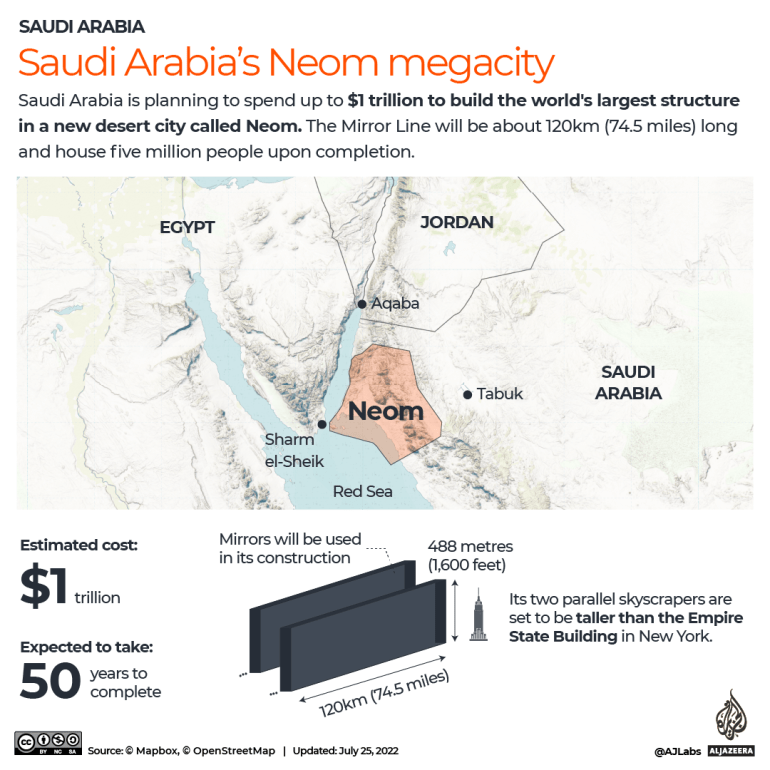
Beyond energy, analysts have said leaders from the two countries are expected to discuss potential deals that could see Chinese firms become more deeply involved in megaprojects that are central to the crown prince’s vision of diversifying Saudi Arabia’s economy away from oil.
Those projects include a futuristic $500bn megacity known as NEOM, a so-called “cognitive” city that will depend heavily on facial recognition and surveillance technology.
Saudi Arabia to host China-Arab summit during Xi visit, sources say
- Medium Text
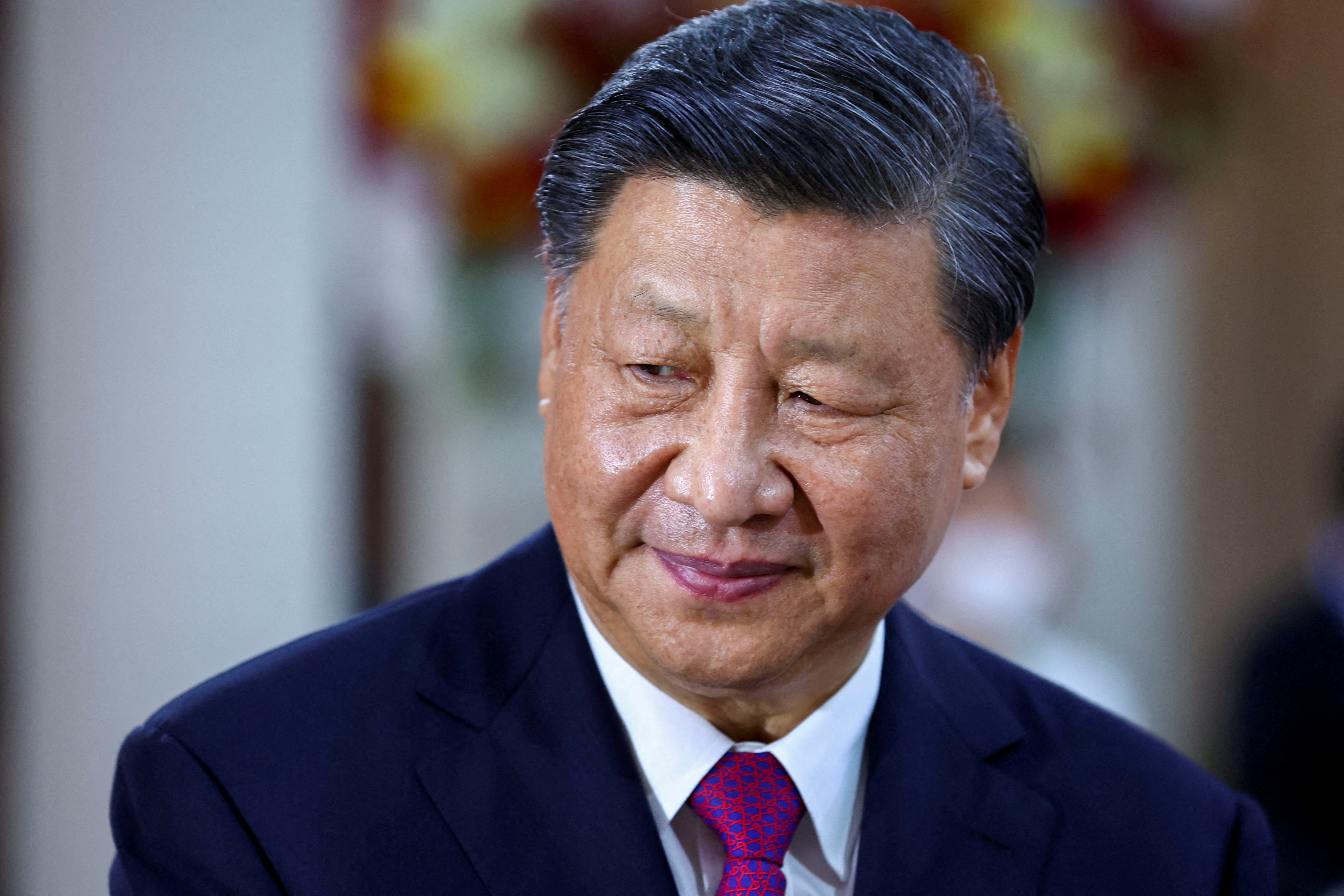
Sign up here.
Reporting by Aziz El Yaakoubi in Riyadh and Julie Zhu in Hong Kong; Additional reporting by Yew Lun Tian; Editing by Ghaida Ghantous and Nick Macfie
Our Standards: The Thomson Reuters Trust Principles. New Tab , opens new tab

World Chevron
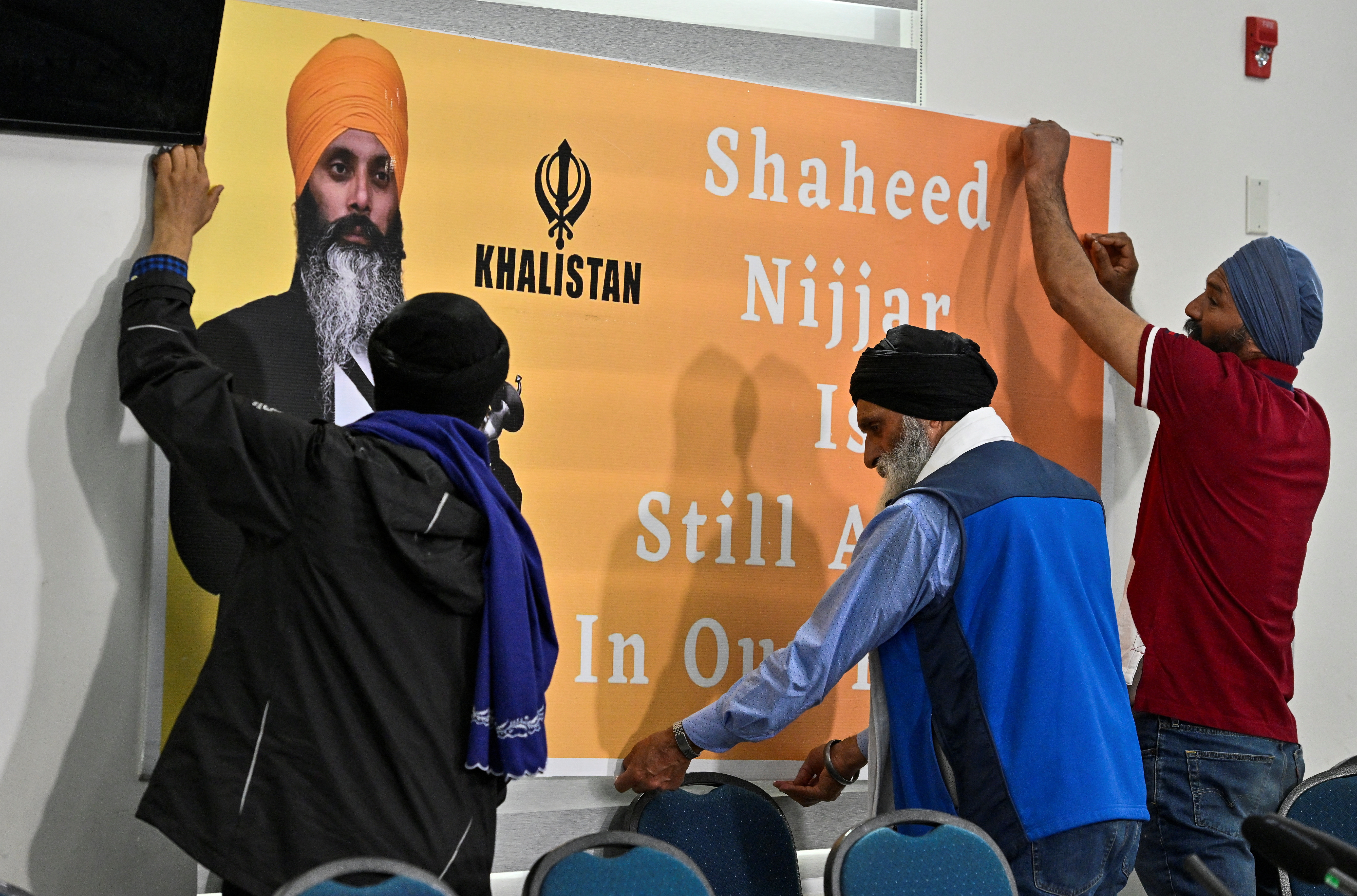
Canada police charge three with murder of Sikh leader Nijjar, probe India link
Canadian police on Friday arrested and charged three Indian men with the murder of Sikh separatist leader Hardeep Singh Nijjar last year and said they were probing whether the men had ties to the Indian government.
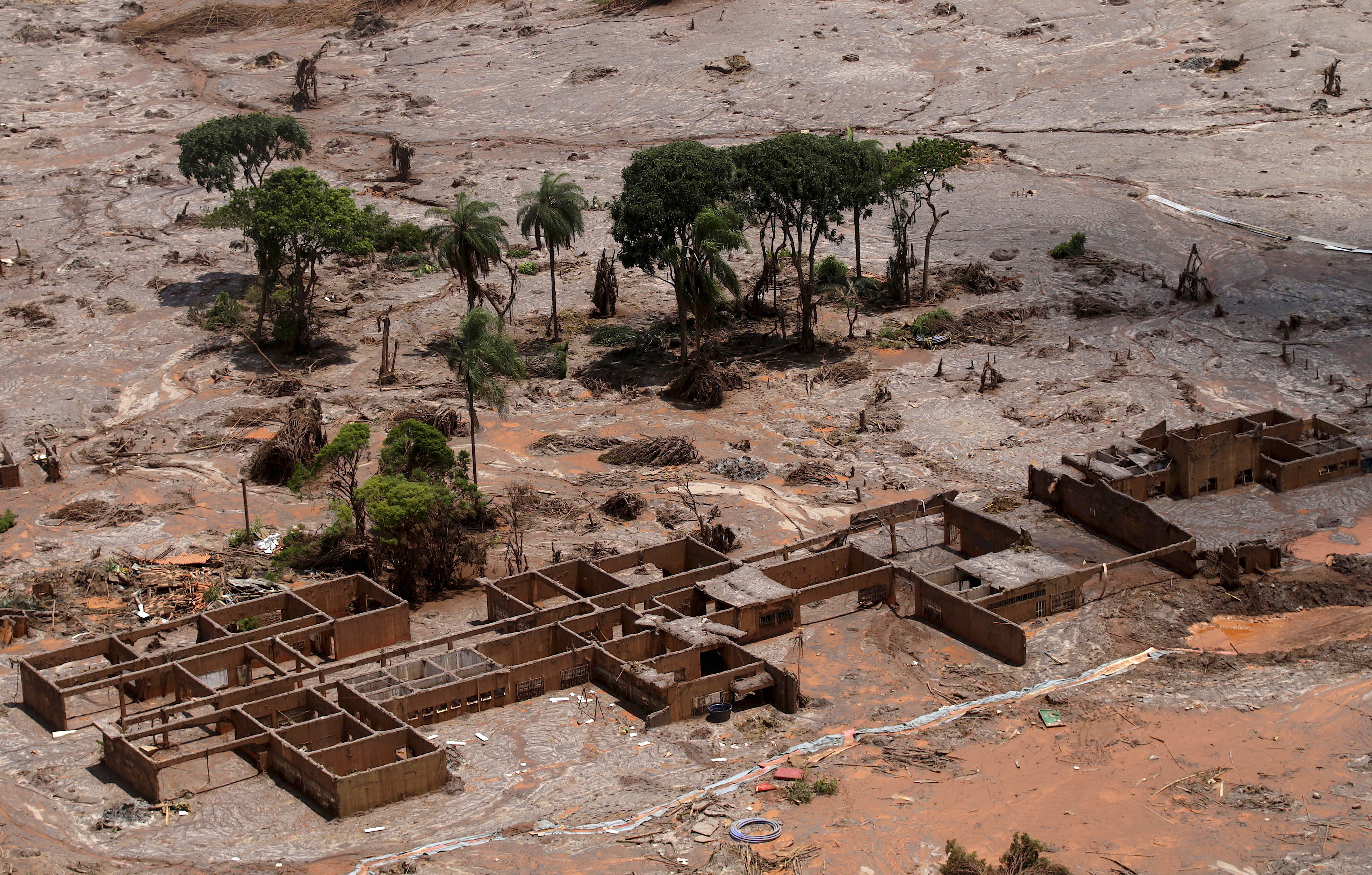
Debris from downed Russian drones struck civilian targets early on Saturday in Kharkiv, Ukraine's second largest city, injuring three people and sparking a fire in an office building, the regional governor said.

- Latest News
- Emergencies
- Ask the Law
- GN Fun Drive
- Visa+Immigration
- Phone+Internet
- Reader Queries
- Safety+Security
- Banking & Insurance
- Dubai Airshow
- Corporate Tax
- Top Destinations
- Corporate News
- Electronics
- Home and Kitchen
- Consumables
- Saving and Investment
- Budget Living
- Expert Columns
- Community Tips
- Cryptocurrency
- Cooking and Cuisines
- Guide to Cooking
- Art & People
- Friday Partner
- Daily Crossword
- Word Search
- Philippines
- Australia-New Zealand
- Corrections
- From the Editors
- Special Reports
- Pregnancy & Baby
- Learning & Play
- Child Health
- For Mums & Dads
- UAE Success Stories
- Live the Luxury
- Culture and History
- Staying Connected
- Entertainment
- Live Scores
- Point Table
- Top Scorers
- Photos & Videos
- Course Reviews
- Learn to Play
- South Indian
- Arab Celebs
- Health+Fitness
- Gitex Global 2023
- Best Of Bollywood
- Special Features
- Investing in the Future
- Know Plan Go
- Gratuity Calculator
- Notifications
- Prayer Times
Chinese President Xi Jinping arrives on a three-day visit to Saudi Arabia
Chinese leader will take part in summit with Saudi Crown Prince and other Arab leaders
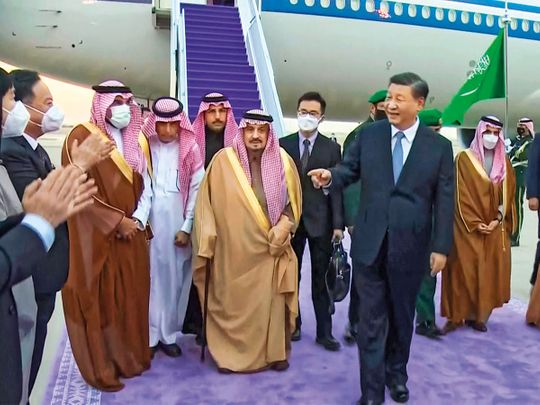
Riyadh: President Xi Jinping arrived in the Saudi Arabian capital Riyadh on Wednesday, Chinese state broadcaster CCTV reported.
The three-day trip is Xi's third overseas journey since the coronavirus pandemic began, and his first to Saudi Arabia since 2016.
- Saudi Arabia and China sign strategic deals as Chinese President Xi Jinping heralds 'new era' in ties
Xi will take part in a regional summit with Saudi Crown Prince Mohammad bin Salman and other Arab leaders, the kingdom’s SPA state news agency said.
Saudi Energy Minister Prince Abdul Aziz bin Salman said on Wednesday that Saudi Arabia would remain a trusted and reliable energy partner for China, state news agency SPA reported.
Prince Abdul Aziz told SPA that cooperation between China, the world's biggest energy consumer, and the kingdom, the worlds' top oil exporter, had helped maintain global oil market stability.
- China-Arab closeness is rooted in common interests
- Saudi Arabia to host China-Arab summit during Xi visit, diplomats familiar with the plans say
"The kingdom will remain, in this area, a trusted and reliable partner for China," the agency quoted him as saying.
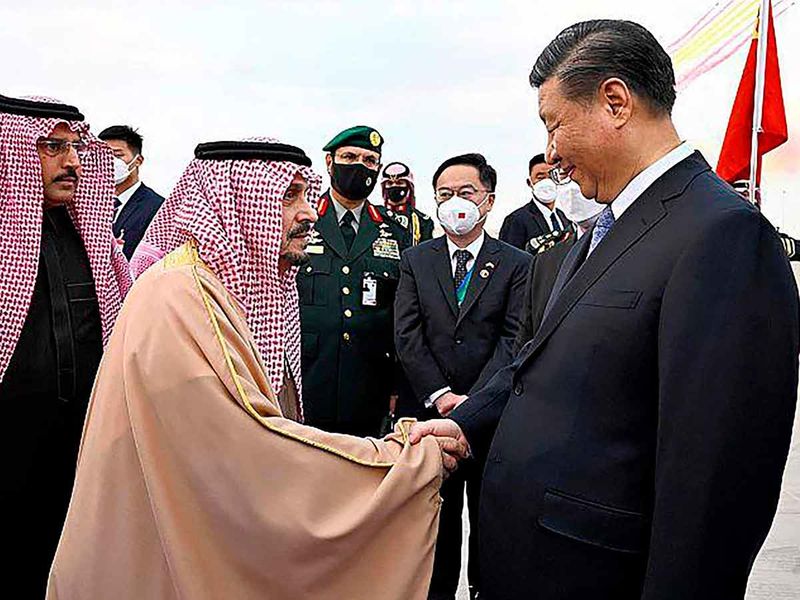
He said Saudi Arabia and China would seek to boost cooperation in energy supply chains by establishing a regional centre in the Gulf Arab state for Chinese factories.
Energy and infrastructure deals will top the agenda, according to two people briefed on the plans. More than 20 initial agreements worth SR110 billion ($29.26 billion) will be signed during Xi’s visit, the official Saudi Press Agency (SPA) reported on Tuesday.
“This visit is the culmination or crowning of a deep strengthening in relations over the last few years,” said Ali Shihabi, a Saudi commentator and advisory board member for the kingdom’s Neom megaproject.
“The US is concerned about this but cannot slow this already strong relationship down.”
A low point in US-Saudi ties came in October when Biden accused Riyadh of allying with Russia on oil production cuts, and vowed “consequences.” However, relations have been fraying for some time as the US shifts its global focus to the competition with China.
US-Saudi trade shrinks from $76b in 2012 to $29b last year
It’s a decade since the US was Riyadh’s biggest trading partner, and in that time not only has China leapfrogged America, but so too have India and Japan. Total US-Saudi trade shrank from some $76 billion in 2012 to $29 billion last year.
Talks on a free trade agreement between China and the six-nation Gulf Cooperation Council are entering a “final stage,” China’s ambassador to the United Arab Emirates Zhang Yiming said last month.
“There’s a real synergy to the relationship,” said Jonathan Fulton, a nonresident senior fellow at the Atlantic Council focused on China’s relations with the Gulf.
Whereas “the US keeps talking about a great power game” and focusing on counterterrorism, China has been helping address domestic concerns.
Since China held its last biennial dialog with Arab states in July 2020, Saudi Aramco revived discussions to build a multi-billion dollar refining and petrochemicals complex in China.
Saudi Arabia started working with Huawei to develop artificial intelligence systems and the kingdom’s using Chinese expertise to make its own drones. It’s even been reported to be manufacturing ballistic missiles with China’s help, according to a US intelligence assessment.
More From Saudi

Saudi Arabia: Dhahran mosque roof collapses due to rain

Acwa Power obtains $3 billion for Saudi projects

Jawazat chief visits NEOM Bay airport

Saudi employers urged to meet registration deadline

Hajj-related ‘Road to Mecca’ expanded in Pakistan
Saudi Crown Prince gives speech at WEF special meeting
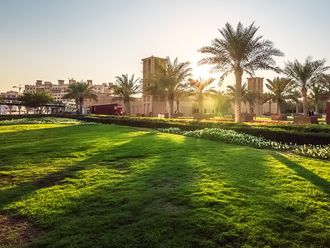
Saudi Arabia: Ground cleared for tree per baby

Saudi Arabia moves to expose illegal Hajj pilgrims
Nepal court orders limit on everest climbing permits, uae president receives condolences at mushrif palace, hamas weighs gaza truce proposal, unstable weather conditions end, uae confirms, is your child ready for a smartphone.

Get Breaking News Alerts From Gulf News
We’ll send you latest news updates through the day. You can manage them any time by clicking on the notification icon.
- Skip to main content
- Keyboard shortcuts for audio player
What's at stake for Xi Jinping's trip to Saudi Arabia
NPR's Steve Inskeep talks to Yu Jie, who studies China's relationships with Middle East and Gulf states, about Chinese president Xi's trip to Saudi Arabia and China's influence in the region.
Copyright © 2022 NPR. All rights reserved. Visit our website terms of use and permissions pages at www.npr.org for further information.
NPR transcripts are created on a rush deadline by an NPR contractor. This text may not be in its final form and may be updated or revised in the future. Accuracy and availability may vary. The authoritative record of NPR’s programming is the audio record.
- International edition
- Australia edition
- Europe edition

Saudi Arabia readies full state pageantry for Xi Jinping visit
Chinese president’s three-day trip to Riyadh will lead to a ‘strategic agreement’ between the authoritarian powers
Xi Jinping will arrive in Riyadh on Wednesday on a long awaited visit to a regional ally that has readied full state pageantry and a round of agreements likely to cement ties between China and Saudi Arabia – and deepen alarm in Washington.
China’s president will meet more than 30 heads of state and business leaders during his three-day visit to the Saudi capital, which is set to lead to a “strategic agreement” between the authoritarian powers. The trip is the culmination of decades of cooperation once based on oil sales, which has grown into bilateral trade of close to $90bn a year.
The reception that awaits Xi is on a scale of that afforded to Donald Trump during the early months of his administration and is in stark contrast to the low key and largely fruitless visit of his successor, Joe Biden, to Jeddah in August.
Biden had arrived in Saudi Arabia seeking assurances over global oil prices, which the kingdom had refused to help lower by cutting supply. He left empty handed and with bedrock ties between the two allies under serious challenge , as Riyadh appeared to support Vladimir Putin’s war in Ukraine.
Saudi Arabia and Gulf states have been deepening ties with Russia and China over recent years as they question the security partnership that had underpinned relationships over recent decades. The UAE has been particularly aggrieved by what it sees as Washington’s lack of support for attacks on its capital earlier this year by Houthi forces in Yemen, and for the 2017 offensive it co-launched with Riyadh against Houthi groups.
Both sides see a US restriction on arms sales as undermining Washington’s traditional role as underwriter of its security needs.
The kingdom has been rattled by a lack of US response to attacks by Shia militias against its main refinery. The country’s de facto leader, Crown Prince Mohammed bin Salman, meanwhile, was angered by Biden’s vow at the outset of his administration to consider him a pariah, after US intelligence agencies concluded that he ordered the assassination of dissident Jamal Khashoggi .
Prince Mohammed’s allies did little to hide their delight after Biden failed to persuade the Crown Prince to open oil pipes and help decrease prices before US midterm elections. On that same trip, Biden pledged that the US would not lose influence to China in the Middle East. “We will not walk away and leave a vacuum to be filled by China, Russia, or Iran,” he said
The contrast to Xi’s reception, however, could not be more marked. China and Saudi Arabia’s already lucrative deals across the technology, industrial, petrochemical and weapons sectors are likely to be significantly expanded, anchoring Beijing’s aegis at a time that the US has repivoted towards security threats in Asia and the war in Ukraine.
The visit offers the most visible platform yet for Riyadh to showcase its pulling power as a trade partner and emerging presence as a global voice to be reckoned with. Beijing is already Riyadh’s biggest trading partner and Saudi Arabia is a member of the belt and road global infrastructure plan.
“We have said for a long time that there are more people to dine with than Washington,” said a senior Saudi official. “That message will be very clear when this visit gets under way. The Chinese do not lecture and they don’t disrespect. They know how to do business.
“The Americans on the other hand have wanted us to choose sides. We will not.”
The US has been unsettled by what it sees as China and Saudi Arabia’s direct support for Russia’s war effort in Ukraine. Russia has increased efforts to sell discounted oil to Beijing at a time when it faces crippling western sanctions. Beijing remains heavily dependent on oil for its energy demands and has made no secret of its intent to consolidate energy and political ties with the GCC.
Before the visit, Chinese flags were being hung across Riyadh and in ceremonial halls where Xi will be received. Gulf leaders and business figures were expected to arrive on Wednesday, with many receiving hurried invitations earlier this week.
- Saudi Arabia
- Mohammed bin Salman
- Asia Pacific
Most viewed
VIDEO : Xi Jinping to visit Saudi Arabia in first overseas trip since pandemic
- X (formerly Twitter)
Xi Jinping is expected to receive a better reception than US President Joe Biden in Saudi Arabia, as the Chinese leader prepares his first overseas trip since the pandemic.
- Foreign Affairs
Stories from ABC News
18 million first-time voters in india.
Indigenous artefacts sent to Germany have returned to Adelaide Plains
PM criticises the decision to remove a former detainee's ankle monitor
US police forcefully raid pro-Palestinian university encampments
New South Wales expected to be drenched by sustained rainfall
China's Xi Jinping Meets Arab Leaders In "Milestone" Saudi Arabia Trip
The meetings come on the third and final day of xi's first visit to saudi arabia since 2016 and only his third overseas trip since the coronavirus pandemic began..

State media have said that deals worth about $30 billion were expected to be signed during the visit.
Chinese President Xi Jinping will meet Arab leaders at summits in Riyadh on Friday after striking a series of agreements with Saudi Arabia, strengthening ties as the top oil exporter quarrels with Washington.
The leader of the world's second biggest economy will sit down with regional rulers on the third and final day of his trip, only his third journey outside China since the coronavirus pandemic began.
After talks with King Salman and his 37-year-old son Crown Prince Mohammed bin Salman, the de facto ruler, the two sides stressed "the importance of stability" in oil markets -- a point of friction with the United States, which has urged the Saudis to raise production.
In a joint statement, they also spoke of "focusing on emissions rather than sources" in tackling climate change, the approach championed by the resource-rich Gulf monarchies.
Forty-six agreements and memorandums of understanding were announced on everything from housing to Chinese language teaching. Both sides are seeking economic and strategic benefits by deepening cooperation.
However, few details were released despite a Saudi state media report on Thursday that about $30 billion in deals would be signed during Xi's visit.
The two sides "stressed the importance of continuing joint action in all fields, deepening relations within the framework of the comprehensive strategic partnership between the two countries, and reaching new and promising horizons", the statement said.
Xi's visit comes at a time of tension between Saudi Arabia and the United States, its long-time partner and security guarantor, over oil production, human rights issues and regional security.
It follows US President Joe Biden's trip to Jeddah in July, before mid-term elections, when he failed to persuade the Saudis to pump more oil to calm prices.
- 'Prestige' trade deals -
State television showed leaders from the six-country, resource-rich Gulf Cooperation Council -- including the Qatari emir and Bahraini king -- arriving at the conference venue in Riyadh on Friday.
Prince Mohammed addressed the group, briefly reiterating the kingdom's positions on regional issues such as the war in Yemen. They met privately, to be joined later by Xi and his delegation.
A broader China-Arab summit will follow the China-GCC talks.
The Gulf countries, strategic partners of Washington, are bolstering ties with China as part of an eastward turn that involves diversifying their fossil fuel-reliant economies.
At the same time China, hit hard by its Covid lockdowns, is trying to revive its economy and widen its sphere of influence, notably through its Belt and Road Initiative which provides funding for infrastructure projects around the world.
Officials have provided few details about Friday's agenda, but one potential area is a China-GCC free trade agreement that has been under discussion for nearly two decades.
"China will want to draw the lengthy negotiations to a close, as FTAs with major trading blocs is a matter of prestige for Beijing," said Robert Mogielnicki of the Arab Gulf States Institute in Washington.
"It's not as simple for the GCC states, which seem to be more invested in advancing bilateral ties and are engaged in varying degrees of regional economic competition with their neighbouring member states."
A breakthrough on the trade pact could help Saudi Arabia, the Middle East's biggest economy, diversify its economy in line with the Vision 2030 reform agenda championed by Prince Mohammed.
China's foreign ministry has described Xi's trip as the "largest-scale diplomatic activity between China and the Arab world" since the People's Republic of China was founded.
Promoted Listen to the latest songs, only on JioSaavn.com
The visit has already earned a rebuke from the White House, which warned of "the influence that China is trying to grow around the world". Washington called Beijing's objectives "not conducive to preserving the international rules-based order".
(Except for the headline, this story has not been edited by NDTV staff and is published from a syndicated feed.)
Track Budget 2023 and get Latest News Live on NDTV.com.
Track Latest News Live on NDTV.com and get news updates from India and around the world .
India Elections | Read Latest News on Lok Sabha Elections 2024 Live on NDTV.com . Get Election Schedule , information on candidates, in-depth ground reports and more - #ElectionsWithNDTV
Watch Live News:

United States Institute of Peace
Home ▶ Publications
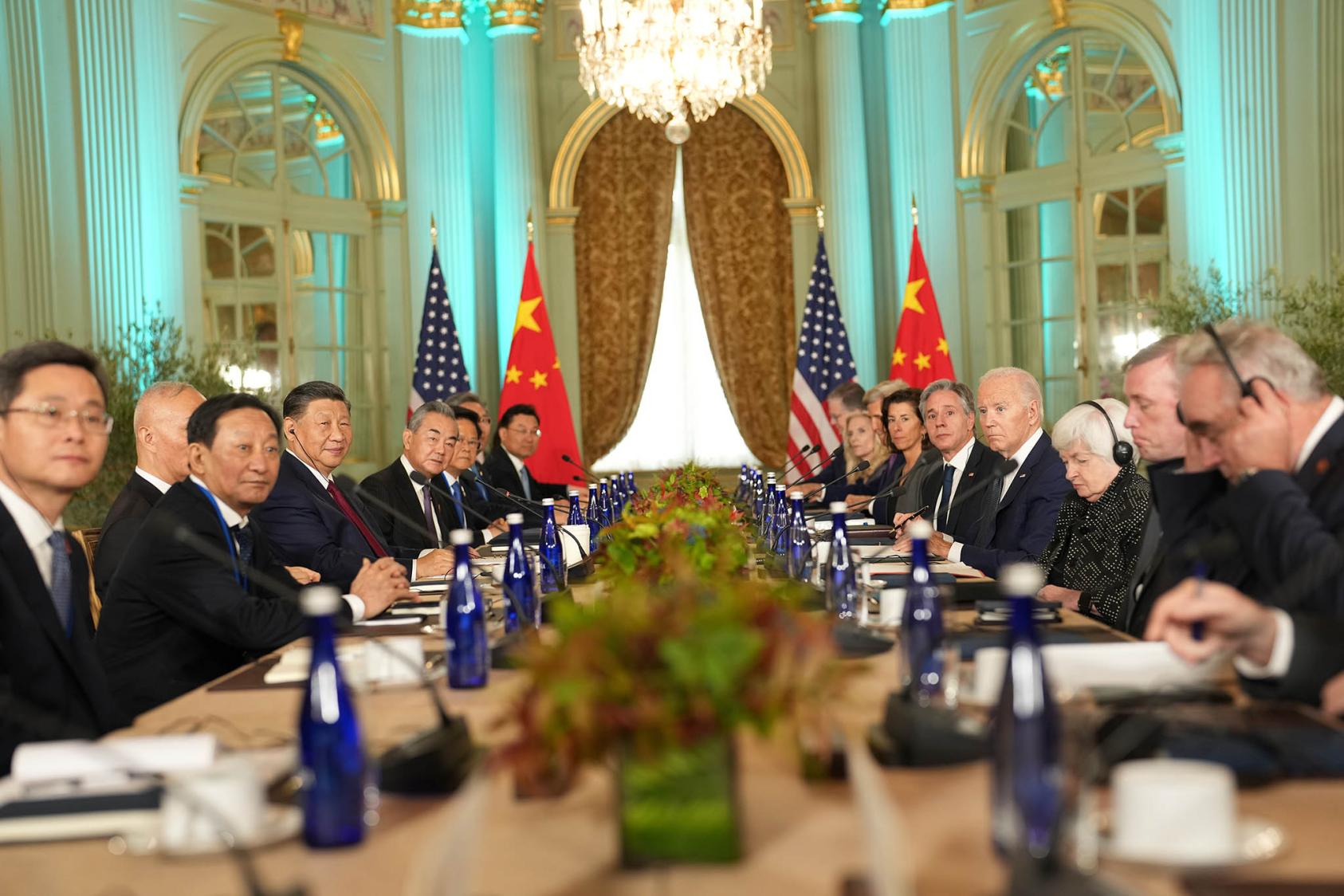
Blinken’s China Trip Shows Both Sides Want to Stabilize Ties
Cooperation is not off the table but will not be the thrust of U.S.-China interactions.
Tuesday, April 30, 2024
/ READ TIME: 8 minutes
By: Rosie Levine ; Carla Freeman, Ph.D. ; Andrew Scobell, Ph.D.
U.S. Secretary of State Antony Blinken traveled to China last week as part of a series of recent high-level contacts between Washington and Beijing. Although no major breakthroughs came out of the trip, it demonstrates that both sides want to prevent bilateral ties from sinking any lower, even as U.S.-China competition continues to intensify.
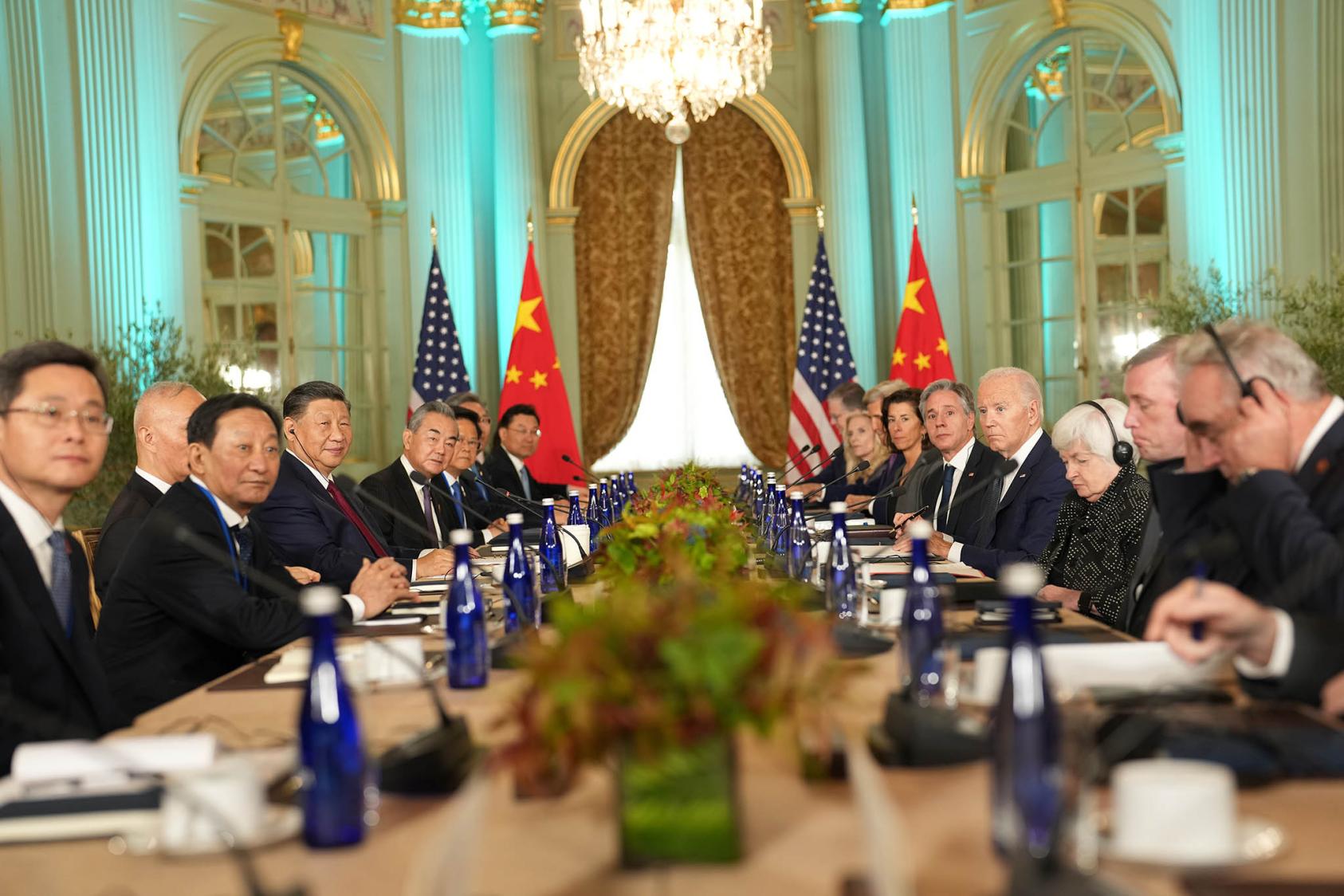
Tensions in the South China Sea remain a dangerous flash point, as the U.S. has responded to China’s aggressive actions there by strengthening its alliances and partnerships in the region and ramping up maritime military exercises. While it’s unlikely the two sides will come to a resolution any time soon on the wide range of bilateral and international domains of disagreement, Blinken’s trip highlighted key areas for U.S.-China cooperation and engagement.
USIP’s Rosie Levine, Carla Freeman and Andrew Scobell discuss what this visit tells us about the U.S. approach to China and what it means for relations between the two powers.

What was expected for Blinken’s visit to Beijing and did it deliver?
Levine: The U.S.-China bilateral relationship is still marked by deep-seated tensions and intensifying strategic competition. The visit is the latest in a series of high-level contacts between the United States and China aimed at improving communication. This is Blinken’s second visit to China within the last 12 months. The last visit, in June, marked the resumption of communications after a period of frozen high-level contact following former House speaker Nancy Pelosi’s visit to Taiwan in August 2022 and Blinken’s derailed February 2023 visit, which canceled in reaction to China’s spy balloon .
President Biden and Chinese leader Xi Jinping’s recent phone call built upon the shared agenda generated at their San Francisco meeting in November 2023. Treasury Secretary Janet Yellen led an economic delegation to China earlier this month, and Foreign Minister Wang Yi and National Security Advisor Jake Sullivan have been meeting regularly over the past few years, including in Washington, Bangkok and Vienna. Notably, in April, Defense Secretary Lloyd Austin resumed military dialogues with his Chinese counterpart in Hawaii, allowing for the first high-level, military-to-military exchange since November 2022.
Despite the higher frequency of contact, there was limited optimism that this visit would bring a significant change in the bilateral relationship. It was clear that Blinken approached the meetings with a wish list of agenda items , including cooperation on AI governance, managing the supply chain of precursor chemicals used in the production of fentanyl, risks of conflict over Taiwan, increasing hostilities in the South China Sea and warnings to Xi about China’s support for Russia’s war in Ukraine.
The areas where the meeting seemed to break ground were on the issues of cooperation on curbing the flow of synthetic opioids, a willingness to collaborate on AI governance and people-to-people ties. Blinken met China's minister of public security, Wang Xiaohong, and noted the early successes of the bilateral Counter Narcotics Working Group . He also pointed to official U.S.-China talks on artificial intelligence that will be held in the coming weeks. Blinken visited the New York University Shanghai campus and underscored the importance for the next generations of Americans and Chinese to better understand one another to solve shared challenges in the future.
Xi greeted Blinken and both reiterated the desire to stabilize the relationship. If Xi had failed to greet Blinken, it could have signaled de-prioritization of mending ties with the United States.
It is clear that Blinken sent various messages on issues of importance to American interests and global peace and security. One point Blinken underscored in his press briefing was the dissatisfaction from the U.S., NATO allies and G7 partners toward China for its role in supporting Russia’s war effort by supplying machine tools and other components Russia uses for producing ammunition. While it is clear that the message was delivered , it remains unclear if or how China will respond to this critique. Russian President Vladimir Putin is scheduled to travel to China in May, and there is little indication China will change its approach to its relationship with Russia.
What does Blinken’s visit signal about the U.S. approach to China?
Freeman: Blinken’s visit marks a U.S. effort to steady the U.S.-China relationship. The administration’s policy of “managed competition” with China continues to define its approach but Washington now seeks to inject greater stability into the bilateral relationship with its rival by pursuing a number of key approaches.
First, Blinken’s visit made clear that there is no new framing for the bilateral relationship that might refocus it on expanding U.S.-China cooperation amid significant areas of difference between the two sides. However, Blinken laid out a set of U.S. priorities for its diplomacy toward China. Amid mistrust and friction across a range of issues, action-reaction dynamics have typified recent bilateral interactions, giving the relationship a risky unpredictability and further aggravating tensions. The effort to articulate a focused set of administration priorities for the relationship aims to curb this volatility by focusing bilateral diplomacy on key U.S. interests. These include the areas of potential U.S.-China cooperation mentioned above as well areas where the U.S. sees China’s policies and actions as harming the interests of the United States and its allies.
Second, the visit made clear that the administration will work to open and sustain more channels of bilateral communication to reduce the risk of miscalculation and military escalation between the two sides. A key priority is military-to-military communications, which Blinken emphasized is urgently needed to reduce the risk of an escalatory military encounter between the two countries facing off in the waters and skies in the Taiwan Strait and South China Sea.
But these also include more diplomatic lines of communication, people-to-people ties and information flows that help reduce misunderstanding between the two sides. As Blinken underscored, information flows are also key to curbing trafficking in illicit drugs and their precursors, as well as other areas of transnational crime. Sustaining open channels will be a priority as the administration seeks to address its concerns on such sensitive issues as how China uses advanced U.S. technologies, as well as China’s industrial capacity.
Third, while Blinken carried a warning on the impact of China’s ongoing economic cooperation with Russia as “ powering ” the war in Ukraine, the top U.S. diplomat also suggested that the administration views China as a potentially constructive actor in helping to resolve international conflict, including in the Middle East.
That Blinken offered no grand visions for the U.S.-China relationship during his visit to Beijing makes clear that the administration has no plans to reframe the U.S.-China relationship. Instead, Washington will focus on mitigating turbulence in the relationship through more robust diplomacy on issues of friction in the relationship. Cooperation is not off the table but will not be the thrust of U.S.-China interactions.
What does Blinken’s visit mean for U.S.-China relations?
Scobell: Blinken’s recent three-day visit to China underscores both the value and limitations of in-person meetings between senior U.S. officials and their Chinese counterparts. During the on-going frosty era in U.S.-China relations, high-level direct dialogue is important. As Blinken noted before his meeting with Chinese Minister of Foreign Affairs Wang Yi: “There’s no substitute for face-to-face diplomacy … in order to try and move forward, but also to make sure that we’re as clear as possible about the areas where we have differences … to avoid misunderstandings [and] miscalculations.” It is noteworthy that other more focused dialogues have resumed or are scheduled to begin in the near future. The latter includes military-to-military discussions, while the former includes talks on Artificial Intelligence.
But the limitations on face-to-face talks are also real. While objectively speaking, Xi is correct in reportedly saying to Blinken that “[t]he world is big enough to accommodate the simultaneous development and prosperity of both China and the United States,” this is frankly not the way leaders in Beijing — or in Washington for that matter — perceive each other and the tumultuous current global situation. China’s communist rulers perceive that the United States is trying to contain China militarily and restrain its economic growth. U.S. leaders, meanwhile, perceive that China’s communist rulers are actively working to undermine the rules-based international order and weaken the United States. China’s rulers believe that the United States is strengthening security ties with its allies and partners in the Indo-Pacific and beyond to encircle China while U.S. leaders believe Beijing is stepping up its coercive activities against multiple neighbors, notably Taiwan and the Philippines, as well as strengthening an alliance-like relationship with Moscow.
While Blinken’s discussions with Xi, Wang and other senior Chinese communist rulers last week were far from being dialogues of the deaf, it does appear that to at least to a considerable extent each side was talking past the other. That said, the good news is that both sides sincerely seem to want a more stable bilateral relationship and are prepared to try and work toward this end. The bad news is that each side blames the other for the abysmal state of U.S.-China relations and expects the other side to take the first step to ameliorate ties. At least neither side wants to take a step backwards.
The views expressed in this publication are those of the author(s).
PUBLICATION TYPE: Question and Answer

‘To the Future’: Saudi Arabia Spends Big to Become an A.I. Superpower
The oil-rich kingdom is plowing money into glitzy events, computing power and artificial intelligence research, putting it in the middle of an escalating U.S.-China struggle for technological influence.
More than 200,000 people converged on the Leap tech conference in the desert outside Riyadh in March. Credit... Iman Al-Dabbagh for The New York Times
Supported by
- Share full article

By Adam Satariano and Paul Mozur
Adam Satariano reported from Riyadh, Saudi Arabia, and Paul Mozur from Taipei, Taiwan.
- Published April 25, 2024 Updated April 26, 2024
On a Monday morning last month, tech executives, engineers and sales representatives from Amazon, Google, TikTok and other companies endured a three-hour traffic jam as their cars crawled toward a mammoth conference at an event space in the desert, 50 miles outside Riyadh.
The lure: billions of dollars in Saudi money as the kingdom seeks to build a tech industry to complement its oil dominance.
To bypass the congestion, frustrated eventgoers drove onto the highway shoulder, kicking up plumes of desert sand as they sped past those following traffic rules. A lucky few took advantage of a special freeway exit dedicated to “V.V.I.P.s” — very, very important people.
“To the Future,” a sign read on the approach to the event, called Leap.

More than 200,000 people converged at the conference, including Adam Selipsky, chief executive of Amazon’s cloud computing division, who announced a $5.3 billion investment in Saudi Arabia for data centers and artificial intelligence technology. Arvind Krishna, the chief executive of IBM, spoke of what a government minister called a “lifetime friendship” with the kingdom. Executives from Huawei and dozens of other firms made speeches. More than $10 billion in deals were done there, according to Saudi Arabia’s state press agency.
“This is a great country,” Shou Chew, TikTok’s chief executive, said during the conference, heralding the video app’s growth in the kingdom. “We expect to invest even more.”
- Shou Chew, TikTok’s chief executive, promoted the video app’s growth in Saudi Arabia during the Leap conference. Iman Al-Dabbagh for The New York Times
- One of the booths at the Leap conference, which was attended by executives from Google, Amazon, TikTok and others. Iman Al-Dabbagh for The New York Times
- A robotic dog walking through the Leap conference. Iman Al-Dabbagh for The New York Times
Everybody in tech seems to want to make friends with Saudi Arabia right now as the kingdom has trained its sights on becoming a dominant player in A.I. — and is pumping in eye-popping sums to do so.
Saudi Arabia created a $100 billion fund this year to invest in A.I. and other technology. It is in talks with Andreessen Horowitz, the Silicon Valley venture capital firm, and other investors to put an additional $40 billion into A.I. companies. In March, the government said it would invest $1 billion in a Silicon Valley-inspired start-up accelerator to lure A.I. entrepreneurs to the kingdom. The initiatives easily dwarf those of most major nation-state investments, like Britain’s $100 million pledge for the Alan Turing Institute.
The spending blitz stems from a generational effort outlined in 2016 by Crown Prince Mohammed bin Salman and known as “Vision 2030.” Saudi Arabia is racing to diversify its oil-rich economy in areas like tech, tourism, culture and sports — investing a reported $200 million a year for the soccer superstar Cristiano Ronaldo and planning a 100-mile-long mirrored skyscraper in the desert.
For the tech industry, Saudi Arabia has long been a funding spigot. But the kingdom is now redirecting its oil wealth into building a domestic tech industry, requiring international firms to establish roots there if they want its money.
If Prince Mohammed succeeds, he will place Saudi Arabia in the middle of an escalating global competition among China, the United States and other countries like France that have made breakthroughs in generative A.I. Combined with A.I. efforts by its neighbor, the United Arab Emirates, Saudi Arabia’s plan has the potential to create a new power center in the global tech industry.
“I hereby invite all dreamers, innovators, investors and thinkers to join us, here in the kingdom, to achieve our ambitions together,” Prince Mohammed remarked in a 2020 speech about A.I.
His ambitions are geopolitically delicate as China and the United States seek to carve out spheres of influence over A.I. to shape the future of critical technologies.
In Washington, many worry that the kingdom’s goals and authoritarian leanings could work against U.S. interests — for instance, if Saudi Arabia ends up providing computing power to Chinese researchers and companies. This month, the White House brokered a deal for Microsoft to invest in G42, an A.I. company in the Emirates, which was intended partly to diminish China’s influence.
For China, the Persian Gulf region offers a big market, access to deep-pocketed investors and a chance to wield influence in countries traditionally allied with the United States. China’s form of A.I.-powered surveillance has already been embedded into policing in the region .
Some industry leaders have begun to arrive. Jürgen Schmidhuber, an A.I. pioneer who now heads an A.I. program at Saudi Arabia’s premier research university, King Abdullah University of Science and Technology, recalled the kingdom’s roots centuries ago as a center for science and mathematics.
“It would be lovely to contribute to a new world and resurrect this golden age,” he said. “Yes, it will cost money, but there’s a lot of money in this country.”
The willingness to spend was front and center last month at a gala in Riyadh hosted by the Saudi government, which coincided with the Leap conference. Hollywood klieg lights blazed in the sky above the city as guests arrived in chauffeured Maseratis, Mercedes-Benzes and Porsches. Inside a 300,000-square-foot parking garage that had been converted two years ago into one of the world’s largest start-up spaces, attendees mingled, debated opening offices in Riyadh and sipped pomegranate juice and cardamom-flavored coffee.
“There’s something happening here,” said Hilmar Veigar Petursson, the chief executive of CCP Games, the Icelandic company behind the popular game Eve Online, who was at the gala. “I got a very similar sense when I came back from China in 2005.”
A Sci-Fi Script
Prince Mohammed’s Vision 2030 project, unveiled eight years ago, seems taken from a science-fiction script.
Under the plan, new futuristic cities will be built in the desert along the Red Sea, oriented around tech and digital services. And the kingdom, which has piled billions into tech start-ups like Uber and investment vehicles such as SoftBank’s Vision Fund, would spend more.
That drew Silicon Valley’s attention. When Prince Mohammed visited California in 2018, Sergey Brin, Google’s co-founder, escorted him through a tree-lined path at the company’s campus. Tim Cook, Apple’s chief executive, showed him the company’s products. The prince also traveled to Seattle, where he met with Bill Gates of Microsoft; Satya Nadella, the company’s chief executive; and Jeff Bezos of Amazon.
It was a key moment for Saudi Arabia’s tech ambitions as Prince Mohammed presented himself as a youthful, digitally savvy reformer. But enthusiasm dimmed a few months later when Jamal Khashoggi, a Washington Post columnist and critic of the crown prince, was killed at the Saudi Consulate in Istanbul. Prince Mohammed denied involvement, but the C.I.A. concluded that he had approved the killing .
For a brief period, it was seen as untoward to associate with Saudi Arabia. Business executives canceled visits to the kingdom. But the lure of its money was ultimately too strong.
A.I. development depends on two key things that Saudi Arabia has in abundance: money and energy. The kingdom is pouring oil profits into buying semiconductors, building supercomputers, attracting talent and constructing data centers powered by its plentiful electricity. The bet is that Saudi Arabia will eventually export A.I. computing muscle.
Majid Ali AlShehry, the general manager of studies for the Saudi Data and A.I. Authority, a government agency overseeing A.I. initiatives, said 70 percent of the 96 strategic goals outlined in Vision 2030 involved using data and A.I.
“We see A.I. as one of the main enablers of all sectors,” he said in an interview at the agency’s office in Riyadh, where employees nearby worked on an Arabic chatbot called Allam.
Those goals have permeated the kingdom. Posters for Vision 2030 are visible throughout Riyadh. Young Saudis describe the crown prince as running the kingdom as if it were a start-up. Many tech leaders have parroted the sentiment.
“Saudi has a founder,” Ben Horowitz, a founder of Andreessen Horowitz, said last year at a conference in Miami. “You don’t call him a founder. You call him his royal highness.”
Some question whether Saudi Arabia can become a global tech hub. The kingdom has faced scrutiny for its human rights record, intolerance to homosexuality and brutal heat. But for those in the tech world who descended on Riyadh last month, the concerns seemed secondary to the dizzying amount of deal-making underway.
“They are just pouring money into A.I.,” said Peter Lillian, an engineer at Groq, a U.S. maker of semiconductors that power A.I. systems. Groq is working with Neom, a futuristic city that Saudi Arabia is building in the desert, and Aramco, the state oil giant. “We’re doing so many deals,” he said.
Torn Between Superpowers
Situated along the Red Sea’s turquoise waters, King Abdullah University of Science and Technology has become a site of the U.S.-Chinese technological showdown.
The university, known as KAUST, is central to Saudi Arabia’s plans to vault to A.I. leadership. Modeled on universities like Caltech, KAUST has brought in foreign A.I. leaders and provided computing resources to build an epicenter for A.I. research.
To achieve that aim, KAUST has often turned to China to recruit students and professors and to strike research partnerships , alarming American officials. They fear students and professors from Chinese military-linked universities will use KAUST to sidestep U.S. sanctions and boost China in the race for A.I. supremacy , analysts and U.S. officials said.
Of particular concern is the university’s construction of one of the region’s fastest supercomputers, which needs thousands of microchips made by Nvidia, the biggest maker of precious chips that power A.I. systems. The university’s chip order, with an estimated value of more than $100 million, is being held up by a review from the U.S. government, which must provide an export license before the sale can go through.
Both China and the United States want to keep Prince Mohammed close. A.I. ambitions add a new layer of geopolitical significance to a kingdom already key to Middle East policy and global energy supplies. A 2016 visit to Saudi Arabia by Xi Jinping, China’s leader, paved the way for new tech cooperation. Accustomed to top-down industrial policy, Chinese companies have expanded rapidly in the kingdom, forming partnerships with major state-owned companies. The United States has pushed Saudi Arabia to pick a side, but Prince Mohammed seems content to benefit from both nations.
Mr. Schmidhuber, the researcher leading KAUST’s A.I. efforts, has seen the jostling up close. Considered a pioneer of modern A.I. — students in a lab he led included a founder of DeepMind, an innovative A.I. company now owned by Google — he was lured to the desert in 2021.
He was reluctant to move at first, he said, but university officials, via a headhunter, “tried to make it more attractive and even more attractive and even more attractive for me.”
Now Mr. Schmidhuber is awaiting the completion of the supercomputer, Shaheen 3, which is a chance to attract more top talent to the Persian Gulf and to give researchers access to computing power often reserved for major companies.
“No other university is going to have a similar thing,” he said.
Some in Washington fear the supercomputer may provide researchers from Chinese universities access to cutting-edge computing resources they would not have in China. More than a dozen students and staff members at KAUST are from military-linked Chinese universities known as the Seven Sons of National Defense, according to a review by The New York Times. During the Trump administration, the United States blocked entry to students from those universities over concerns they could take sensitive technologies back to China’s military.
“The United States should quickly move to deny export licenses to any entity if the end user is likely to be a P.R.C. actor affiliated with the People’s Liberation Army,” Representative Mike Gallagher, a Republican from Wisconsin, said in a statement.
A senior White House official, speaking on the condition of anonymity, said that the default U.S. policy was to share technology with Saudi Arabia, a critical ally in the gulf, but that there were national security concerns and risks with A.I.
The Commerce Department declined to comment. In a statement, China’s Ministry of Foreign Affairs said, “We hope that relevant countries will work with China to resist coercion, jointly safeguard a fair and open international economic and trade order, and safeguard their own long-term interests.”
A KAUST spokeswoman said, “We will strictly comply with all U.S. export license terms and conditions for the full life cycle of Shaheen 3.”
Mr. Schmidhuber said the Saudi government was ultimately aligned with the United States. Just as U.S. technology helped create Saudi Arabia’s oil industry, it will play a critical role in A.I. development.
“Nobody wants to jeopardize that,” he said.
The Gold Rush
Aladin Ben, a German Tunisian A.I. entrepreneur, was in Bali last year when he received an email from a Saudi agency working on A.I. issues. The agency knew his software start-up, Memorality, which designs tools to make it easier for businesses to incorporate A.I., and wanted to work together.
Since then, Mr. Ben, 31, has traveled to Saudi Arabia five times. He is now negotiating with the kingdom on an investment and other partnerships. But his company may need to incorporate in Saudi Arabia to get the full benefit of the government’s offer, which includes buying hundreds of annual subscriptions to his software in a contract worth roughly $800,000 a month.
“If you want a serious deal, you need to be here,” Mr. Ben said in an interview in Riyadh.
Saudi Arabia was once viewed as a source of few-strings-attached cash. Now it has added conditions to its deals, requiring many companies to establish roots in the kingdom to partake in the financial windfall.
That was evident at GAIA, an A.I. start-up accelerator, for which Saudi officials announced $1 billion in funding last month.
Each start-up in the program receives a grant worth about $40,000 in exchange for spending at least three months in Riyadh, along with a potential $100,000 investment. Entrepreneurs are required to register their company in the kingdom and spend 50 percent of their investment in Saudi Arabia. They also receive access to computing power purchased from Amazon and Google free of charge.
About 50 start-ups — including from Taiwan, South Korea, Sweden, Poland and the United States — have gone through GAIA’s program since it started last year.
“We want to attract talent, and we want them to stay,” said Mohammed Almazyad, a program manager for GAIA. “We used to rely heavily on oil, and now we want to diversify.”
One of the biggest enticements for A.I. start-ups is the chance to make the deep-pocketed Saudi government a customer. In one recent meeting, Abdullah Alswaha, a senior minister for communications and information technology, asked GAIA’s start-ups to suggest what they could provide for the Saudi government, including for megacity projects like Neom . Afterward, many of the companies received messages introducing them to state-owned businesses, Mr. Almazyad said.
“I would say this process at the first stages is not organic,” he said. “You don’t find this in Silicon Valley. Eventually the process will be organic.”
Deciding to set up in Riyadh comes with challenges. There’s the heat, reaching more than 110 degrees in the summer, as well as the adjustments of moving to a deeply religious Muslim kingdom. While Saudi Arabia has loosened some restrictions in recent years, freedom of speech remains limited and L.G.B.T.Q. people can face criminal penalties.
Mr. Almazyad, who hopes to eventually study in the United States, said cultural differences could make it hard to recruit international A.I. talent. But he cautioned against underestimating Saudi Arabia’s resolve.
“This is just the beginning,” he said.
Adam Satariano is a technology correspondent based in Europe, where his work focuses on digital policy and the intersection of technology and world affairs. More about Adam Satariano
Paul Mozur is the global technology correspondent for The Times, based in Taipei. Previously he wrote about technology and politics in Asia from Hong Kong, Shanghai and Seoul. More about Paul Mozur
Explore Our Coverage of Artificial Intelligence
News and Analysis
Eight daily newspapers owned by Alden Global Capital sued OpenAI and Microsoft , accusing the tech companies of illegally using news articles to power their A.I. chatbots.
The spending that the tech industry’s giants expect A.I. to require, for the chips and data centers , is starting to come into focus — and it is jarringly large.
The table stakes for A.I. start-ups to compete with the likes of Microsoft and Google are in the billions of dollars. And even that may not be enough .
The Age of A.I.
A new category of apps promises to relieve parents of drudgery, with an assist from A.I . But a family’s grunt work is more human, and valuable, than it seems.
Despite Mark Zuckerberg’s hope for Meta’s A.I. assistant to be the smartest , it struggles with facts, numbers and web search.
Much as ChatGPT generates poetry, a new A.I. system devises blueprints for microscopic mechanisms that can edit your DNA.
Could A.I. change India’s elections? Avatars are addressing voters by name, in whichever of India’s many languages they speak. Experts see potential for misuse in a country already rife with disinformation.
Which A.I. system writes the best computer code or generates the most realistic image? Right now, there’s no easy way to answer those questions, our technology columnist writes .
Advertisement
Analysis: Can Xi Win Back Europe?
Create an FP account to save articles to read later and in the FP mobile app.
ALREADY AN FP SUBSCRIBER? LOGIN
World Brief
- Editors’ Picks
- Africa Brief
China Brief
- Latin America Brief
South Asia Brief
Situation report.
- Flash Points
- War in Ukraine
- Israel and Hamas
- U.S.-China competition
- Biden's foreign policy
- Trade and economics
- Artificial intelligence
- Asia & the Pacific
- Middle East & Africa
Inside China’s New Diplomatic Push
Fareed zakaria on an age of revolutions, ones and tooze, foreign policy live.

Spring 2024 Issue
Print Archive
FP Analytics
- In-depth Special Reports
- Issue Briefs
- Power Maps and Interactive Microsites
- FP Simulations & PeaceGames
- Graphics Database
From Resistance to Resilience
The atlantic & pacific forum, redefining multilateralism, principles of humanity under pressure, fp global health forum 2024.
By submitting your email, you agree to the Privacy Policy and Terms of Use and to receive email correspondence from us. You may opt out at any time.
Your guide to the most important world stories of the day
Essential analysis of the stories shaping geopolitics on the continent
The latest news, analysis, and data from the country each week
Weekly update on what’s driving U.S. national security policy
Evening roundup with our editors’ favorite stories of the day
One-stop digest of politics, economics, and culture
Weekly update on developments in India and its neighbors
A curated selection of our very best long reads
Can Xi Win Back Europe?
The chinese leader’s visit follows weeks of escalating tensions between china and the continent..
- Foreign & Public Diplomacy
- Christina Lu
Five years after embarking on his last European tour, Chinese President Xi Jinping is set to return to the continent on Sunday with a new mission: damage control.
When Xi last set foot on the continent, European views of Beijing—and the broader geopolitical landscape—looked dramatically different. In 2019, the COVID-19 pandemic had yet to throttle the world. Russia was still years away from launching its full-scale invasion of Ukraine. Chinese electric vehicles hadn’t yet inundated European markets. And, in a sign of China’s economic and geopolitical clout at the time, Italy had just become the first G-7 nation to join the Belt and Road Initiative (BRI).
European attitudes toward China have soured significantly in the years since, fueled by deepening trade divisions and frustrations over Beijing’s expanded economic and military cooperation with Moscow in the wake of its invasion of Ukraine. With Xi’s upcoming trip—which includes stops in France, Serbia, and Hungary—the Chinese leader is hoping to mend ties over the Russia-Ukraine war and blunt Europe’s push to “de-risk” from his country.
Xi wants to “manage the damage that has been done to the relationship because of the Chinese position in the Russian war in Ukraine,” said Yun Sun, the director of the China program at the Stimson Center, who noted that France, Serbia, and Hungary are the “three countries that are probably the most pro-China” in Europe.
“China wants to retain the affinity with Europe,” she added.
The Chinese leader’s visit follows weeks of escalating tensions as European officials have cracked down on suspected espionage and the European Union threatens to unleash new tariffs over Beijing’s contentious trade practices . In just the past two weeks, German and British authorities have charged six people suspected of spying for China. Brussels has also adopted an increasingly confrontational trade posture toward China, with a slew of investigations into hefty Chinese subsidies for electric vehicles, wind turbines , and solar panels , as well as Beijing’s procurement of medical devices .
“We like fair competition. What we don’t like is when China floods the market with massively subsidized e-cars,” European Commission President Ursula von der Leyen said last month. “That is what we are fighting against. Competition yes, dumping no. That must be our motto.”
With Xi’s visit, Beijing is projecting a rosier image. Chinese state media has billed the state visits as opportunities to “open new chapters of solidarity and cooperation” while “injecting fresh impetus into the nation’s ties with the European Union.” “China-EU relations have shown sound momentum of steady progress, which is in the interest of both sides,” Foreign Ministry spokesperson Lin Jian declared this week.
And the timing of each stop is symbolic, too: 2024 marks the 60th anniversary of China and France’s diplomatic relations, as well as the 75th anniversary of Beijing’s diplomatic ties with Hungary. With Serbia, Xi’s visit to Belgrade is expected to coincide with the 25th anniversary of the U.S. bombing of the Chinese Embassy in the city. The bombing, which occurred amid the 1999 NATO bombing of Yugoslavia and which Washington maintains was accidental , killed three Chinese journalists and sparked a diplomatic firestorm between Beijing and Washington.
Yet Beijing’s message of solidarity and cooperation may not resonate with European leaders who have grown increasingly wary of the deep economic integration that has historically characterized relations. While Europe has long been split over how to best respond to China, Brussels and many European leaders are increasingly adopting a tougher posture toward Beijing as alarm grows over their gaping trade imbalance and a massive flood of cheap Chinese green technology exports .
“We recognize what we see as the Chinese playbook,” Margrethe Vestager, the European commissioner for competition, told Bloomberg Television last month . “Knowing you have been played teaches you that you need to watch out, to be much more observant and to take better actions.”
Xi’s last trip to Europe in 2019 included a flashy ceremony to celebrate Italy’s new participation in the BRI, a major triumph for the Chinese leader’s flagship foreign-policy initiative. Yet Italy turned its back on the BRI last August, dealing a humiliating blow to Beijing’s ambitions on the continent and reflecting just how much attitudes have shifted as leaders reassess their ties with China.
“The de-risking genie is out of the bottle,” said Grzegorz Stec, head of the Brussels office of the Mercator Institute for China Studies. “But while the general concept has been embraced, discussions are still ongoing regarding what exact policies and what level of intensity should the practice of de-risking entail.”
To weaken that push, analysts said Beijing will likely try to take advantage of the diverging interests within Europe, as well as the divisions between European leaders and Washington, which has adopted a far more hawkish line toward China. One of Xi’s aims is “to undermine the kind of united front that the Europeans and the United States were trying to build up, especially when it comes to Russia’s war against Ukraine,” said Liana Fix, an expert in European politics at the Council on Foreign Relations.
That strategy is reflected in Chinese state media, which has framed the Biden administration as a troublemaker eager to dismantle an otherwise productive Europe-China relationship. “Will EU pick sides between China and the U.S.?” one op-ed asks . Despite Washington’s “instigation and coercion,” it reads, “the EU is clear about the importance of maintaining cooperative ties.” Pragmatic European countries “have been trying to interact with China based on their own interests,” it adds.
But with the de-risking genie loose, there may be only so much that the Chinese leader can accomplish.
“The Chinese want to emphasize that de-risking is not good or not constructive for bilateral economic relations,” Sun said. “But I doubt that it will be a successful push because the Europeans’ position, as of now, is fairly clear, that Europe does have concern about, for example, electric vehicles from China.”
Christina Lu is a reporter at Foreign Policy . Twitter: @christinafei
Join the Conversation
Commenting on this and other recent articles is just one benefit of a Foreign Policy subscription.
Already a subscriber? Log In .
Subscribe Subscribe
View Comments
Join the conversation on this and other recent Foreign Policy articles when you subscribe now.
Not your account? Log out
Please follow our comment guidelines , stay on topic, and be civil, courteous, and respectful of others’ beliefs.
Change your username:
I agree to abide by FP’s comment guidelines . (Required)
Confirm your username to get started.
The default username below has been generated using the first name and last initial on your FP subscriber account. Usernames may be updated at any time and must not contain inappropriate or offensive language.
Xi Believes China Can Win a Scientific Revolution
Beijing’s techno-nationalist policies are more geopolitical than economic.
How Europe’s Solar Industry Can Be Saved
A domestic manufacturing sector will enhance the EU’s long-term energy security.
On Sunday, Chinese President Xi Jinping will make his first trip to Europe since 2019. Xi’s visit comes on the heels of two U.S. diplomatic missions to China, from Secretary of State Antony Blinken and Treasury Secretary Janet Yellen. FP’s Ravi Agrawal will ask Evan Medeiros how one should read the recent surge in engagement.
Sign up for Editors' Picks
A curated selection of fp’s must-read stories..
You’re on the list! More ways to stay updated on global news:
Pro-Palestinian Campus Protests Go Global
What in the world, the columbia protests and the economics of divestment, how to stave off a famine in gaza, is ‘the media’ really under attack, editors’ picks.
- 1 The Tech Hawks Took Down TikTok. Now What?
Pro-Palestinian Campus Protests Arise in France, Australia, Mexico
Columbia protests and china space mission: foreign policy's weekly international news quiz, what would divestment from israel cost columbia university, world press freedom day: is ‘the media’ really under attack, more from foreign policy, the iran-israel war is just getting started.
As long as the two countries remain engaged in conflict, they will trade blows—no matter what their allies counsel.
New Zealand Becomes the Latest Country to Pivot to the U.S.
Beijing’s bullying tactics have pushed Wellington into Washington’s welcoming arms.
A Tale of Two Megalopolises
What new cities in Saudi Arabia and Egypt tell us about their autocrats.
The Strategic Unseriousness of Olaf Scholz
His latest trip confirms that Germany’s China policy is made in corporate boardrooms.
The Tech Hawks Took Down TikTok. Now What?
No, college curriculums aren’t too focused on decolonization, the best books for understanding the israel-hamas war, how kyiv plans to use american aid.
Sign up for World Brief
FP’s flagship evening newsletter guiding you through the most important world stories of the day, written by Alexandra Sharp . Delivered weekdays.
- Election 2024
- Entertainment
- Newsletters
- Photography
- Personal Finance
- AP Investigations
- AP Buyline Personal Finance
- AP Buyline Shopping
- Press Releases
- Israel-Hamas War
- Russia-Ukraine War
- Global elections
- Asia Pacific
- Latin America
- Middle East
- Election Results
- Delegate Tracker
- AP & Elections
- Auto Racing
- 2024 Paris Olympic Games
- Movie reviews
- Book reviews
- Personal finance
- Financial Markets
- Business Highlights
- Financial wellness
- Artificial Intelligence
- Social Media
China’s Xi to visit France, Serbia, Hungary as Beijing appears to seek a larger role in Ukraine
FILE - Chinese President Xi Jinping talks to U.S. Secretary of State Antony Blinken at the Great Hall of the People, on April 26, 2024, in Beijing, China. Chinese President Xi Jinping will visit France, Serbia and Hungary next week as Beijing appears to seek a larger role in the conflict between Russia and Ukraine that has upended global political and economic security, China’s foreign ministry said Monday, April 29. (AP Photo/Mark Schiefelbein, Pool, File)
- Copy Link copied
BEIJING, China (AP) — Chinese President Xi Jinping will visit France, Serbia and Hungary next week as Beijing appears to seek a larger role in the conflict between Russia and Ukraine that has upended global political and economic security.
The visit by Xi, China’s president and head of the ruling Communist Party, is his first to Europe in five years and will “inject new momentum to the peaceful development of the world,” Foreign Ministry spokesperson Lin Jian said at a daily briefing on Monday.
China claims neutrality in the Ukraine conflict, but Xi and Russian President Vladimir Putin declared their governments had a “no limits friendship” before Moscow’s February 2022 attack on Ukraine. China has refused to call the Russian assault an invasion and has been accused of bolstering Russia’s financial and technological ability to continue producing weapons for use against Ukraine, which is awaiting tens of billions of dollars in military aid to counter Russia’s aggression.
The Foreign Ministry said Xi’s visits will begin April 5 and end April 10 but gave no further details.
The visits will be closely watched in Washington for any signs of diminishing support for key U.S. foreign policy goals.
French President Emmanuel Macron prompted concerns in Washington during a visit to China last year after saying that France wouldn’t blindly follow the U.S. in getting involved in crises that are not of its concern, an apparent reference to China’s demands for unification with Taiwan.
China has built strong relations with Serbia, including making a semi-secret delivery of an anti-aircraft missile system to the former Yugoslav republic in 2022.
The government of Hungarian Prime Minister Viktor Orbán delayed Sweden’s entry into NATO for months. NATO expansion has been cited by China as provoking Putin to invade Ukraine.
Orbán, a right-wing populist who has forged close ties with Russia, has said that criticism of Hungary’s governance by Swedish politicians soured relations between the two countries and led to reluctance among lawmakers in his Fidesz party to support Sweden’s NATO entry.
The visits come after U.S. Secretary of State Antony Blinken met Friday with Xi in Beijing and stressed the importance of “responsibly managing” the differences between the United States and China as the two sides butt heads over a number of contentious bilateral, regional and global issues .
Also on Friday, Russian Defense Minister Sergei Shoigu hailed military cooperation with China during a meeting with his Chinese counterpart, Dong Jun, in Kazakhstan’s capital, Astana.
He said the cooperation is important as “new hotbeds of tension are emerging and old ones are exacerbating. In essence, this is the result of geopolitical adventures, selfish neo-colonial actions of the West.”

IMAGES
VIDEO
COMMENTS
Years of progressing ties between oil-wealthy Saudi Arabia and China, an economic giant in the east, this week culminated in a multiple-day state visit by Chinese President Xi Jinping to Riyadh ...
Mr. Xi held talks with Crown Prince Mohammed bin Salman, 37, the de facto ruler of Saudi Arabia, in the first of a series of summits planned for the Chinese president's three-day visit.
Saudi Arabia and China showcased deepening ties with a series of strategic deals on Thursday during a visit by President Xi Jinping, including one with tech giant Huawei, whose growing foray into ...
Xi Will Visit Saudi Arabia, a Sign of China's Growing Middle East Ties. Xi Jinping's trip, which will include three regional summits, aims to deepen a relationship with Gulf States that has ...
Saudi Arabia's Crown Prince Mohammed bin Salman welcomed Chinese President Xi Jinping with a lavish reception in the capital Riyadh on Thursday, as the two countries head for a number of summits ...
Chinese leader Xi Jinping traveled to Saudi Arabia this week for a series of summits with countries from around the Middle East, cementing over thirty energy and investment deals and basking in a good bit of pageantry courtesy of the host nation. The warm visit contrasts with US President Joe Biden's muted get-together with Saudi Crown Prince ...
Chinese and Saudi flags adorn a street in Riyadh, Saudi Arabia, ahead of Chinese President Xi Jinping's visit on Dec. 7. FAYEZ NURELDINE/AFP via Getty Images December 7, 2022, 3:53 PM
Chinese President Xi Jinping began a visit to Saudi Arabia on Wednesday that Beijing said marked its biggest diplomatic initiative in the Arab world, as Riyadh expands global alliances beyond a ...
By Reuters. RIYADH, Saudi Arabia — Saudi Arabia and China showcased deepening ties with a series of strategic deals on Thursday during a visit by President Xi Jinping, including one with tech ...
Xi's visit raises pressure on the U.S. in the Mideast. Over the summer, President Biden visited Saudi Arabia aiming to reassure wary allies and asserting the U.S. presence in the region. He told a ...
Chinese leader Xi Jinping is planning to visit Saudi Arabia before the end of the year, according to people familiar with preparations for the trip, as Beijing and Riyadh seek to deepen ties and ...
Chinese President Xi Jinping landed in the Saudi Arabian capital Riyadh on Wednesday for a multiple-day visit, China's official news agency Xinhua reported, amid frayed ties between the two ...
Initial agreements worth $29bn will be signed during a Saudi Arabian-Chinese summit this week, according to the kingdom's official news agency. Chinese President Xi Jinping arrives in Riyadh ...
08/16/2022 04:30 AM EDT. Chinese President Xi Jinping will soon end more than two years of self-imposed in-person diplomatic isolation as he travels to Saudi Arabia to meet with Crown Prince ...
Saudi Arabia plans to host a Chinese-Arab summit on Dec. 9 attended by Chinese President Xi Jinping during his visit to the kingdom, three Arab diplomats in the region familiar with the plans said ...
Riyadh: President Xi Jinping arrived in the Saudi Arabian capital Riyadh on Wednesday, Chinese state broadcaster CCTV reported. The three-day trip is Xi's third overseas journey since the ...
China's leader, Xi Jinping, is on a three-day visit to Saudi Arabia and is expected to meet with Mohammed bin Salman, the powerful crown prince, along with some other leaders from around the ...
NPR's Steve Inskeep talks to Yu Jie, who studies China's relationships with Middle East and Gulf states, about Chinese president Xi's trip to Saudi Arabia and China's influence in the region.
Listen. (2 min) Chinese President Xi Jinping met with Saudi Crown Prince Mohammed bin Salman during a pivotal visit to the Gulf state. The two countries signed agreements, initially valued at more ...
Last modified on Thu 11 Aug 2022 06.41 EDT. The Chinese president Xi Jinping is expected to visit Saudi Arabia next week, where plans are under way for a gala reception to match that given to ...
Xi Jinping will arrive in Riyadh on Wednesday on a long awaited visit to a regional ally that has readied full state pageantry and a round of agreements likely to cement ties between China and ...
Xi Jinping to visit Saudi Arabia in first overseas trip since pandemic. Posted Tue 23 Aug 2022 at 10:21pm, updated Wed 24 Aug 2022 at 5:48am. Watch. 5m. Xi Jinping is expected to receive a better ...
The meetings come on the third and final day of Xi's first visit to Saudi Arabia since 2016 and only his third overseas trip since the coronavirus pandemic began. World News Agence France-Presse ...
Energy is expected to be the focus of Chinese President Xi Jinping's trip to Saudi Arabia. Photo: AFP ... The US' ties with Saudi Arabia, the world's biggest crude oil exporter, and other ...
Although no major breakthroughs came out of the trip, it demonstrates that both sides want to prevent bilateral ties from sinking any lower, even as U.S.-China competition continues to intensify. ... President Biden and Chinese leader Xi Jinping's recent phone call built upon the shared agenda generated at their San Francisco meeting in ...
CNN —. Chinese President Xi Jinping is set to arrive in Saudi Arabia for a state visit amid high tensions between the United States and the two countries, reported the official Saudi Press ...
A 2016 visit to Saudi Arabia by Xi Jinping, China's leader, paved the way for new tech cooperation. Accustomed to top-down industrial policy, Chinese companies have expanded rapidly in the ...
What new cities in Saudi Arabia and Egypt tell us about their autocrats. German Chancellor Olaf Scholz appears with Chinese President Xi Jinping at the State Guest House in Beijing on April 16 ...
BEIJING, China (AP) — Chinese President Xi Jinping will visit France, Serbia and Hungary next week as Beijing appears to seek a larger role in the conflict between Russia and Ukraine that has upended global political and economic security. The visit by Xi, China's president and head of the ruling Communist Party, is his first to Europe in ...
Taipei, Taiwan — China's leader Xi Jinping kicks off a six-day trip to Europe this Sunday, his first visit to the continent since 2019. The trip will include stops in France, Serbia and Hungary ...